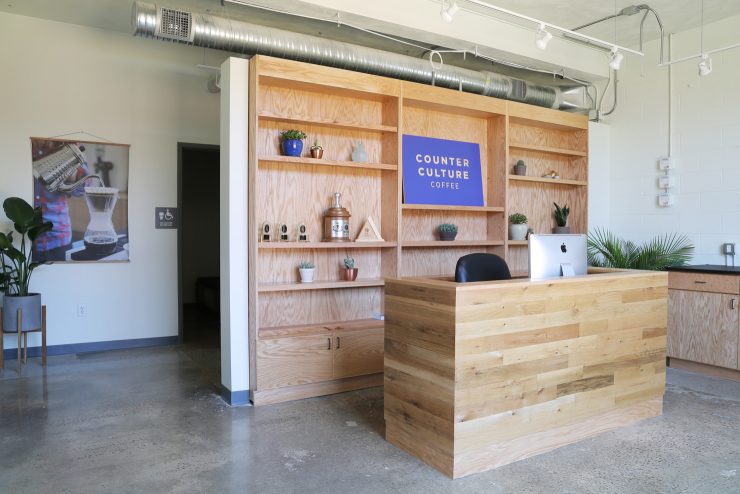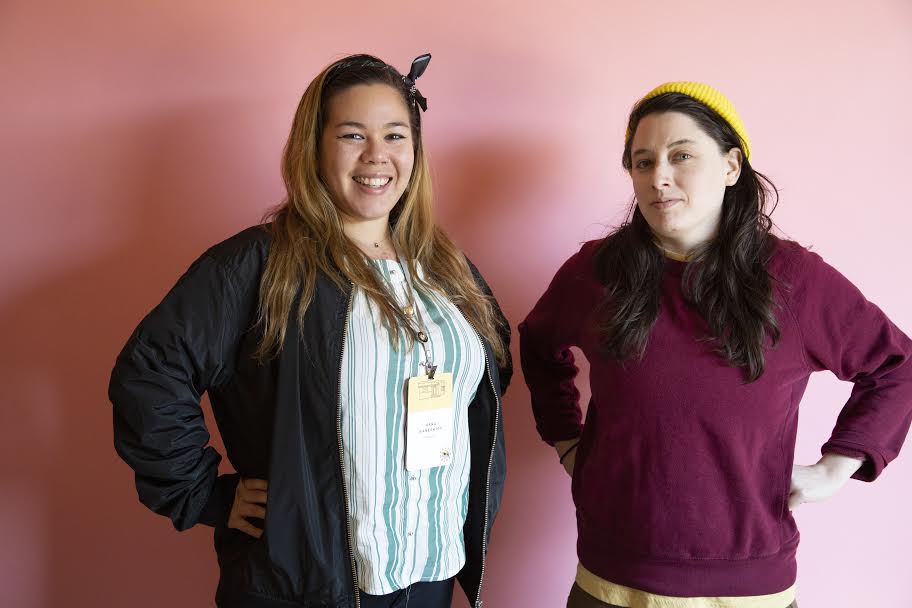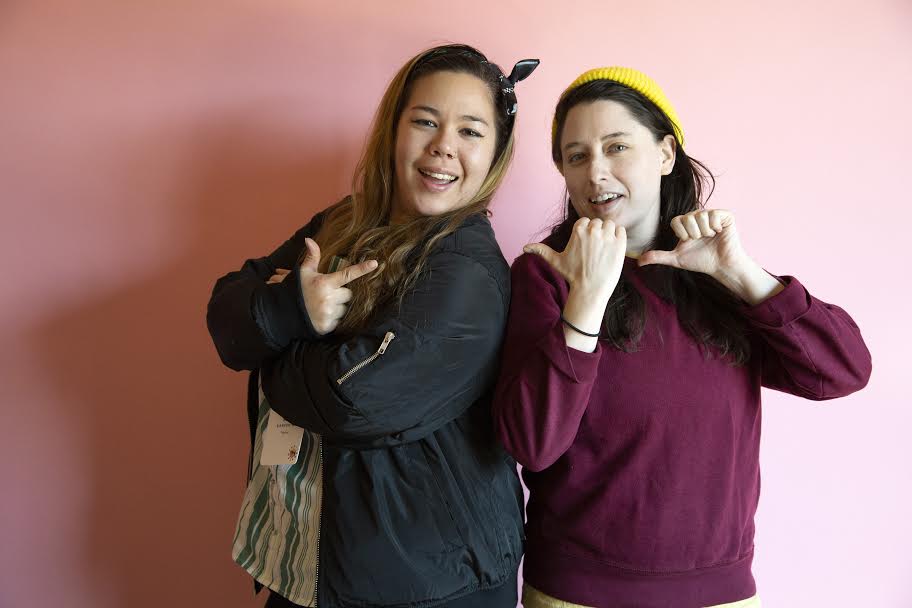
In a world of rapidly rising costs of operation and living, it can feel impossible to make ends meet as a cafe worker. From barista to manager, it’s rare to find a job that offers a living wage, especially before you factor in tips—and, often, it’s not due to stinginess, but razor-thin profit margins on the part of owners. As this pinch grows tighter on all sides, it can become progressively harder for cafes (especially small ones) to gain and retain talent. As wholesale trainers who spend their days training baristas, Counter Culture Coffee educators Jenna Gotthelf of New York City and Hana Kaneshige of Los Angeles want to explore these issues through asking questions and gathering data. Counter Culture’s next Prodev—a quarterly continuing educational series exploring a range of topics relevant to coffee professionals—titled “Baristatainability” will focus on the sustainability of the barista profession.
Leading up to the prodev on June 12, Gotthelf and Kaneshige will be using three surveys to collect data from current and former cafe workers at all levels. These surveys—one for baristas, one for managers and trainers, and one for program directors and owners—will be live until May 5th.

Hana Kaneshige (left) and Jenna Gotthelf.
The coffee industry spends a lot of time focusing on issues coffee producers face, and rightly so, but as Gotthelf and Kaneshige’s project points out, baristas, too, are a critical link in the supply chain. If they can’t afford to stay in their jobs, the whole chain suffers the consequences. I talked with Gotthelf and Kaneshige about the inspiration, goals, and hopes that underpin this project. Read on to learn more about Baristatainability.
Hey Jenna, hey Hana. How long have you both been in coffee?
Jenna Gotthelf: I’ve been working in coffee for eight years.
Hana Kaneshige: About nine years, but in specialty coffee for the last four or five.
What about your experience in coffee inspired you to choose this prodev topic?
HK: Jenna!
JG: Seven of my eight years in the coffee industry were working as a barista behind the bar. I love making coffee for people. The ritual and routine of working behind the bar is satisfying and fun, but it seems like it is a job that comes with an expiration date.
If I had a dollar for every time I heard “you can’t be a barista forever,” I would have enough money to be a barista forever. I watched my colleagues move on from the bar to different jobs in the industry—working in sales, as trainers/educators, as technicians, etc. I felt pressure to do the same, not just because my peers were doing it but because the quality of my life was suffering as a result. It is difficult to make a living wage as a barista.
Barista work is skilled labor. It takes time to hone in and cultivate those skills. We need to change the perception of being a barista from a job with an expiration date to a skilled career full of potential.
How does this topic relate to your jobs as educators for a wholesaler?
JG: We work with and train thousands of baristas a year from a diversity of coffee-serving businesses. We are responsible for inspiring new generations of coffee people. I think it is important to understand where people are coming from, whether it is a restaurant, a small boutique cafe, or a very busy coffee shop so we can deliver information in ways that makes people want to do their jobs.
HK: As a wholesaler, we primarily work with retailers—a large chunk of our time is spent training new hires. However, the most efficient cafes and operations seem to have staff members that have been around a long time, and who know the ins and outs of the business and how to make coffee. When business owners are asking how they can be more efficient or streamline the business, retention is huge—a well-trained employee is far more effective than two brand new employees. It’s helpful (and healthy) to have a mix of both, but workplaces that are able to retain all levels of employees seem to have the best work environment.

What are some of the main issues you see coffee professionals facing at the cafe level?
JG: A major issue I see is not being able to make a living wage or having to work well over 40 hours a week to live reasonably. Not having health insurance is another major issue. Working in a cafe is physical work. There is a lot of wear and tear. If folks aren’t able to take care of themselves because they don’t have access to healthcare, they can’t do their jobs.
HK: It’s a mix of things. For baristas, it’s the need to work multiple jobs or seek promotions to earn a living wage, or to move out of coffee entirely when they are ready for a “real” life (i.e. need health insurance, are looking to start a family, etc.). I’ve also seen baristas seeking promotions they didn’t necessarily want, but are looking for a higher level of benefits or wages.
For those in management, as well as baristas, burnout is very real—the pressure to work day in and day out with minimal days off and minimal opportunity for actual time off.
There seems to be a degree of disconnect between all levels of those working in cafes/owning cafes/managing programs that contributes to devaluing certain positions. Ultimately, baristas are the link between everything we stand for in coffee supply chains and the consumer. We need them to both enjoy their jobs and want to do their jobs.
What do you think needs to happen in the specialty coffee industry to make cafe positions sustainable?
HK: An assessment of wages (of course!) and how to empower staff members so they feel like they are part of something. Trust goes a long way, and fostering a solid and sustainable work environment (in my opinion) involves communication happening across all levels, and confidence that your manager can do your job just as well (if not better) than you can. People have different skill sets, we should reward and encourage that as we aim to be an actually inclusive industry.
JG: Baristas need to be able to make a living wage in healthy work environments without having to compromise.
Why do you feel that coffee workers outside of the cafe need to think about these issues?
HK: A good workplace is a good workplace. There are commonalities that can be applied across the board for those who enjoy (or don’t enjoy) their work environment.
It’s pretty costly to train new employees in anything from the ground up—any industry, coffee included, should be aware of that fact. Those who aren’t in the cafe still generally rely on those in cafes to showcase our product. Even with the rise of subscription services and direct-to-consumer outlets, a lot of people are still being introduced to specialty coffee through cafe, restaurant, or hotel environments. All of these environments have staff members.
JG: Baristas are the most public-facing part of the industry. They are the link between consumers and the rest of the coffee supply cycle. The cafe is a launching point for the coffee industry. If we can have healthy launching points, then we are on our way to a healthier industry.
What changes do you hope to see come out of this project?
JG: I hope to see a shift in the perception of the barista profession.
HK: I’m hoping to see more questions! Having reviewed a few surveys so far, I just want to gather more and more information. Ultimately, one of my goals is to see what makes people want to stay at their job, versus what makes people want to leave their job, and work toward developing a guide for a more sustainable workplace.
What is one thing you want people to take away from this project?
HK: That sustainability is multifaceted—it’s important to consider all aspects, whether it be where our coffee is coming from to how we operate our businesses.
JG: This project is a catalyst. It would rule to see this ProDev grow into other projects, spark conversations, and help with projects that are already happening.
If you currently work or have ever worked in a cafe, take the surveys here:
Baristas: https://forms.gle/TCX6GBtTqLsDDVeVA
Managers/Trainers: https://forms.gle/MyhixJKfa3umaZM68
Program Directors/Owners: https://forms.gle/UuPjwA2FzZD1fYhB9
RJ Joseph (@RJ_Sproseph) is a Sprudge staff writer, publisher of The Knockbox, and coffee professional based in the Bay Area. Read more RJ Joseph on Sprudge Media Network.
Disclosure: Counter Culture Coffee is an advertising partner on the Sprudge Media Network.
The post Concerned About A Barista Living Wage? Take This Survey appeared first on Sprudge.

